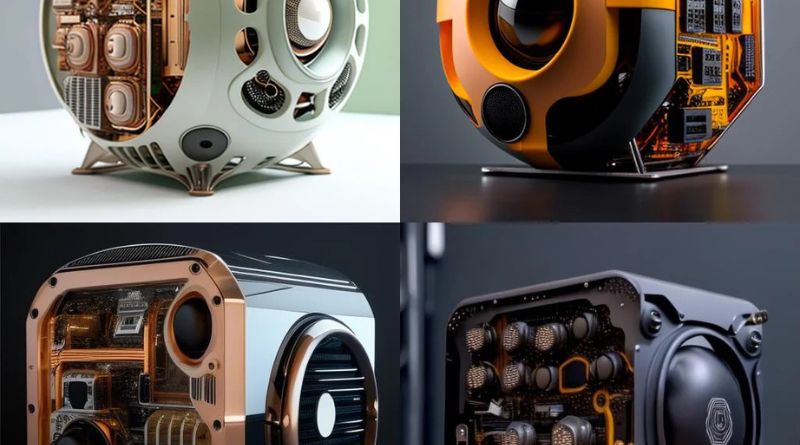
The world of custom PC cases designs has seen tremendous growth in recent years, as computer enthusiasts and professionals seek to personalize their machines not just for performance but also for aesthetics. A custom PC case allows users to create a setup that matches their style while also improving airflow, cable management, and cooling solutions. Whether you are a gamer, content creator, or a professional looking for a specialized workstation, custom PC cases designs offer a variety of options to fit your needs.
Table of Contents
This article delves into the importance of custom PC case designs, the factors to consider when choosing or designing a case, and the wide variety of styles and features available. We’ll also explore some popular types of custom PC case designs and provide answers to frequently asked questions.
Why Opt for Custom PC Cases Designs?
Customizing your PC case is more than just a fashion statement. A well-designed PC case not only enhances the appearance of your setup but also plays a critical role in the overall performance and longevity of your components. Here’s why custom PC cases designs matter:
1. Better Airflow and Cooling
Cooling is a primary concern for anyone building a high-performance PC, especially if it involves overclocking, gaming, or resource-intensive tasks. A custom case can be designed with optimal airflow in mind, allowing you to position cooling fans, radiators, and vents in the most efficient locations. This results in lower temperatures for your CPU, GPU, and other components, improving both performance and longevity.
2. Personalized Aesthetic
One of the most exciting aspects of custom PC cases designs is the ability to reflect your personal style. Whether you prefer a sleek, minimalist design or a more extravagant, illuminated, RGB-infused case, the possibilities are endless. Custom cases allow users to choose the material, size, color, and design to suit their taste, giving their setup a unique and personal touch.
3. Enhanced Cable Management
Good cable management is essential for both aesthetic reasons and practical functionality. A clean setup with neatly organized cables ensures better airflow, reduces clutter, and makes maintenance or upgrades easier. Custom PC cases can feature hidden compartments, cable routing channels, and tie-down points to help organize cables in an efficient manner.
4. Space for Specialized Components
Some users need specific hardware configurations, such as multiple GPUs, large cooling solutions, or additional storage drives. Off-the-shelf PC cases might not have the required space for these components. Custom PC cases can be designed to accommodate special setups and ensure that all your components fit comfortably while maintaining efficient airflow.
5. Noise Reduction
While gaming or working, noise from PC fans and components can be distracting. Custom cases can incorporate soundproofing materials like foam panels and acoustic insulation to dampen noise levels, providing a quieter computing experience.
Factors to Consider in Custom PC Cases Designs
When it comes to designing or selecting a custom PC case, there are several important factors to keep in mind:
1. Form Factor
The form factor of your PC case determines the size and compatibility of your components. The most common form factors are ATX, Micro ATX, and Mini ITX. It’s essential to choose a case that supports your motherboard, as well as your GPU, power supply, and cooling solutions. Additionally, you need to decide whether you want a full tower, mid-tower, or small form factor (SFF) case based on your available space and hardware requirements.
2. Cooling Solutions
Custom PC cases provide a fantastic opportunity to optimize cooling solutions. Depending on your needs, you can choose between air cooling with fans or water cooling with custom loops. Fans are the most common cooling solution and can be easily placed in a custom design for effective airflow. For advanced cooling, you can add custom water cooling loops with radiators, pumps, and reservoirs.
3. Material Choices
Custom PC cases are available in a variety of materials, each offering unique aesthetics and durability. Popular materials include:
- Steel: Sturdy and affordable, steel is a common material for PC cases. It provides good protection but can be heavy.
- Aluminum: Lighter and more premium than steel, aluminum offers a sleek appearance and better thermal properties. It’s commonly used in high-end cases.
- Tempered Glass: Often used for panels and side windows, tempered glass adds a sophisticated touch and allows users to show off their components, especially with RGB lighting.
- Acrylic: Lighter and more affordable than tempered glass, acrylic is commonly used in budget custom cases, though it can scratch more easily.
4. Accessibility and Expandability
A custom PC case should allow easy access to internal components for maintenance, upgrades, and cleaning. Removable panels, tool-less design features, and cable management options are all considerations that can make your life easier when working with the case.
5. Aesthetic Design
Whether you’re building a minimalist or futuristic PC setup, the aesthetic design is key to making your custom case unique. You can choose from various design elements such as colors, lighting effects, and external features like custom etching, logos, or modding. The case can be painted, have lighting strips installed, or feature custom cutouts for a personalized look.
Popular Types of Custom PC Cases Designs
Now that we understand the key considerations, let’s take a look at some popular custom PC cases designs that are trending in the market:
1. Open-Air Cases
Open-air cases are designed with minimal walls or enclosures, offering an exposed view of the components. This design is often favored by enthusiasts who want to show off their hardware and allow for maximum airflow. It’s important to note that open-air cases may collect more dust and require more frequent cleaning.
2. Modular Cases
Modular custom cases allow users to adjust or reconfigure the case structure according to their needs. These cases can be expanded or restructured to accommodate different components, making them highly adaptable for future upgrades.
3. Compact ITX Cases
Compact ITX cases are designed for small form factor builds and are ideal for users who want a portable or minimalist setup. These cases are perfect for users who don’t need to fit in multiple GPUs but want a small, sleek PC for everyday use or gaming.
4. Vertical Cases
Vertical custom PC cases stand out by mounting the components upright instead of horizontally. This unique design is often used to create a futuristic look and highlight components like GPUs and cooling systems.
5. Custom Water-Cooling Loops
Many custom PC cases are designed specifically for water cooling systems, allowing users to integrate custom loops that cool their components more efficiently than traditional air cooling. These cases often feature built-in mounts for reservoirs, pumps, and radiators, offering a more professional and streamlined water-cooling experience.
FAQs
1. How much does a custom PC case cost?
The price of a custom PC case can vary greatly depending on the materials used, the complexity of the design, and the size. Basic customizations can start as low as $50–$100, while high-end, premium cases can cost $300 or more. Custom-built cases with advanced features, such as custom water-cooling loops or RGB lighting, can push the price even higher.
2. Do I need specialized tools to design or modify a PC case?
For basic modifications, such as adding fan mounts or changing the paint job, simple hand tools may suffice. However, more advanced customizations (such as cutting or drilling metal, adding custom water-cooling loops, or installing custom panels) might require specialized tools. Many enthusiasts also opt for custom PC case designers who offer professional services.
3. Are custom PC cases difficult to build?
Building a custom PC case may require some technical knowledge and skills, especially if you’re modifying the structure or installing advanced cooling systems. However, there are plenty of guides and tutorials available online for first-time builders. If you prefer not to build it yourself, professional services can help bring your design to life.
4. Can I customize a pre-made PC case?
Yes, many users start with a pre-made case and modify it to fit their needs. This can involve painting, adding new cooling solutions, replacing panels, or incorporating RGB lighting. Custom PC modding is a great way to get a unique look without starting from scratch.
5. How do I improve airflow in my custom PC case?
To improve airflow in a custom PC case, ensure that you have adequate intake and exhaust fans positioned in optimal locations. You can also improve airflow by keeping cables organized, choosing fans with higher airflow ratings, and selecting components with low heat output.
Conclusion
Custom PC cases designs offer endless possibilities for those looking to build or modify a PC tailored to their specific needs. From better cooling and cable management to aesthetic appeal and functionality, the custom case can transform an ordinary machine into a high-performance powerhouse with a unique visual appeal. Whether you’re looking to create a cutting-edge gaming rig or a streamlined workstation, investing time and effort into a custom case is a rewarding experience that pays off in both style and performance.




